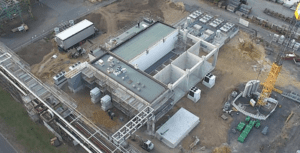Shell (The Hague, the Netherlands) has announced plans to manufacture sustainable aviation fuels (SAF) in the Wesseling section of its Rhineland Refinery in Germany. To this end, the company wants to set up its first commercial Bio-PTL (Power-to-Liquid) plant. The synthetically produced fuel is intended to help reduce airlines’ CO2 footprint. In addition, the capacity of the PEM hydrogen electrolysis plant, which Shell is currently completing in Wesseling together with ITM Power, is to be increased tenfold from the current 10 megawatts to 100 megawatts.
Shell and its partners, ITM Power, ITM Linde Electrolysis GmbH (ILE) and Linde, are applying for funding from the EU and Germany for both projects. A final investment decision for both projects is still pending.

The 10 MW PEM hydrogen electrolysis at the Wesseling plant is currently under construction and is scheduled to go into operation in summer 2021 as one of the world’s first plants for the production of green hydrogen (Source: Shell)
Both projects are integral parts of the planned transformation of the site into the “Shell Energy and Chemicals Park Rhineland,” including an Energy Campus, for which the company is currently looking for partners.
“The Rheinland Refinery is the engine and heart of Shell’s activities in Germany and will play a key role in providing products that are increasingly different from our current crude oil-dominated range and that will increasingly convert to regenerative solutions such as synthetic and biofuels as well as green hydrogen,” explains refinery director Dr. Marco Richrath.
Synthetic fuels are seen as a beacon of hope for drastically reducing carbon dioxide (CO2) emissions, especially in aviation, in the coming decades. The PTL system should make a contribution to this. It would reduce CO2 emissions by more than 80% in the production of kerosene and raw gasoline (naphtha) compared to conventional products. In addition to green electricity, wood residues are to be used as biomass for production. Construction of the PTL system could start in 2023, and commissioning at the end of 2025. The capacity would initially be around 100,000 tons per year.
In Germany, Shell aims to reorganize its business as the energy transition progresses. To this end, Shell has drawn up a corresponding plan investigating how the company could reduce or offset its greenhouse gas emissions and those that arise when customers use Shell products by over a third within a decade. The refinery plays a key role in this.
Dr. Fabian Ziegler, CEO of Shell Deutschland Oil, explains: “We will only be able to maintain mobility in the future if it is made more sustainable and road users on the road, on water and in the air can significantly reduce emissions. To make this possible, the product portfolio of the location will and must change significantly. “